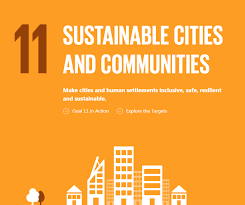The Importance of Sustainable Development Goal 11: Sustainable Cities and Communities
Sustainable Development Goal 11 (SDG 11) focuses on creating sustainable cities and communities that are inclusive, safe, resilient, and environmentally friendly. This goal recognises the rapid urbanisation happening globally and the need to ensure that cities are developed in a way that promotes quality of life for all residents while minimising negative impacts on the environment.
One of the key aspects of SDG 11 is ensuring access to safe and affordable housing for all, as well as upgrading slums to improve living conditions. By providing adequate housing, cities can reduce homelessness and improve overall well-being among their populations.
Additionally, SDG 11 emphasises the importance of sustainable urban planning and management. This includes promoting public transportation, creating green spaces, and implementing measures to mitigate climate change effects within urban areas. Sustainable cities aim to reduce air pollution, congestion, and waste production while promoting energy efficiency and renewable energy sources.
Another critical component of SDG 11 is making cities more inclusive and resilient. This involves ensuring equal access to basic services such as healthcare, education, and sanitation for all residents. By building resilient infrastructure and incorporating disaster risk reduction strategies, cities can better withstand natural disasters and other crises.
Ultimately, achieving SDG 11 is essential for creating livable cities that foster social cohesion, economic growth, and environmental sustainability. Governments, businesses, communities, and individuals all have a role to play in working towards sustainable development goal 11 to create a better future for generations to come.
Understanding Sustainable Development Goal 11: Key Questions and Answers
- What is the SDG Rule 11?
- Why is SDG 11 important to India?
- What does SDG 11 address?
- What is the goal 11 of sustainable development?
- What is the 11th goal of Sustainable Development?
- When was SDG 11 established?
- What is the meaning of responsible consumption and production?
What is the SDG Rule 11?
SDG 11, part of the United Nations’ Sustainable Development Goals, focuses on creating sustainable cities and communities. It aims to ensure that urban areas are developed in a way that promotes inclusivity, safety, resilience, and environmental sustainability. SDG 11 emphasises the importance of access to safe housing, sustainable urban planning, inclusive infrastructure, and resilience-building measures within cities. By addressing these key aspects, SDG 11 seeks to improve the quality of life for urban residents while minimising negative impacts on the environment.
Why is SDG 11 important to India?
Sustainable Development Goal 11 is crucial to India due to the country’s rapid urbanisation and population growth. With a significant portion of India’s population residing in cities, the implementation of SDG 11 is essential for creating sustainable urban environments that can accommodate the needs of all citizens. By focusing on sustainable cities and communities, India can address issues such as inadequate housing, pollution, congestion, and lack of basic services. Achieving SDG 11 in India would not only improve the quality of life for millions of urban residents but also contribute to economic development, social inclusion, and environmental conservation across the country.
What does SDG 11 address?
Sustainable Development Goal 11, also known as SDG 11, addresses the crucial aspects of creating sustainable cities and communities. This goal aims to ensure that urban areas are developed in a way that promotes inclusivity, safety, resilience, and environmental sustainability. SDG 11 focuses on providing access to safe and affordable housing, upgrading slums, promoting sustainable urban planning and management practices, enhancing public transportation systems, creating green spaces, and mitigating the effects of climate change within cities. Additionally, SDG 11 emphasises the importance of building inclusive communities that offer equal access to essential services and infrastructure while fostering social cohesion and economic growth.
What is the goal 11 of sustainable development?
Sustainable Development Goal 11, part of the United Nations’ 2030 Agenda for Sustainable Development, aims to make cities and human settlements inclusive, safe, resilient, and sustainable. This goal focuses on promoting sustainable urban development by ensuring access to adequate housing, transportation systems, green spaces, and infrastructure that is resilient to climate change impacts. By addressing issues such as urbanization, slum upgrading, pollution reduction, and disaster risk management, Goal 11 seeks to create cities and communities that are environmentally friendly and provide a high quality of life for all residents.
What is the 11th goal of Sustainable Development?
The 11th goal of Sustainable Development, also known as Sustainable Development Goal 11 (SDG 11), focuses on creating sustainable cities and communities that are inclusive, safe, resilient, and environmentally friendly. This goal aims to address the challenges posed by rapid urbanization and ensure that urban areas are developed in a way that promotes quality of life for all residents while minimizing negative impacts on the environment. By improving access to safe housing, promoting sustainable urban planning, and enhancing inclusivity and resilience within cities, SDG 11 seeks to create thriving urban environments that benefit both current and future generations.
When was SDG 11 established?
Sustainable Development Goal 11, focusing on sustainable cities and communities, was established by the United Nations in September 2015 as part of the 2030 Agenda for Sustainable Development. This global initiative aims to address the challenges of urbanisation and promote sustainable urban development practices to ensure inclusive, safe, resilient, and environmentally-friendly cities for present and future generations.
What is the meaning of responsible consumption and production?
Responsible consumption and production, as outlined in Sustainable Development Goal 11, refers to the efficient use of resources and the minimisation of waste throughout the entire lifecycle of products. It involves making informed choices as consumers to reduce our environmental impact, promote sustainable practices in production processes, and support businesses that prioritise ethical and environmentally friendly methods. By embracing responsible consumption and production, we can contribute to building more sustainable cities and communities by reducing pollution, conserving resources, and promoting a more circular economy that benefits both people and the planet.

